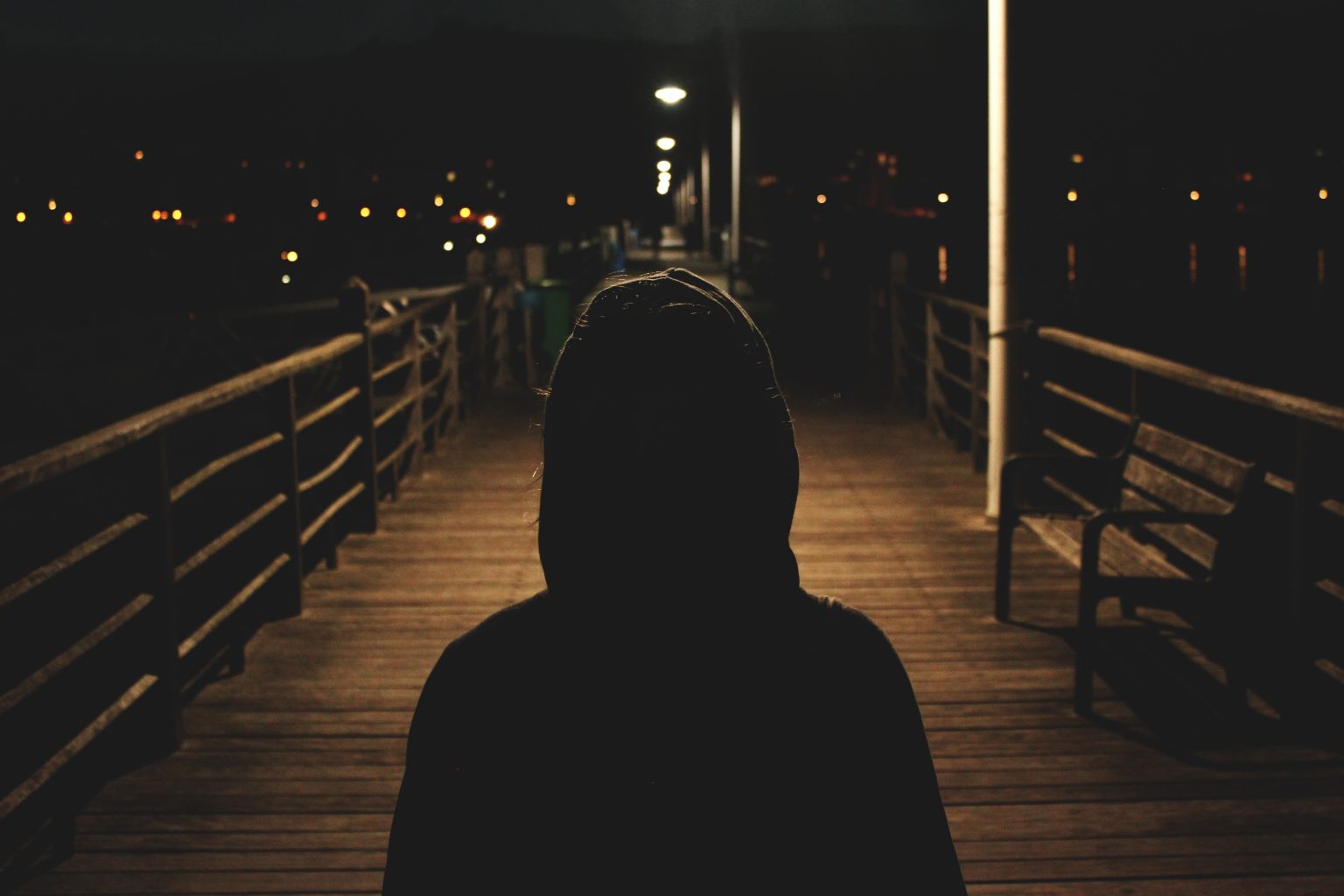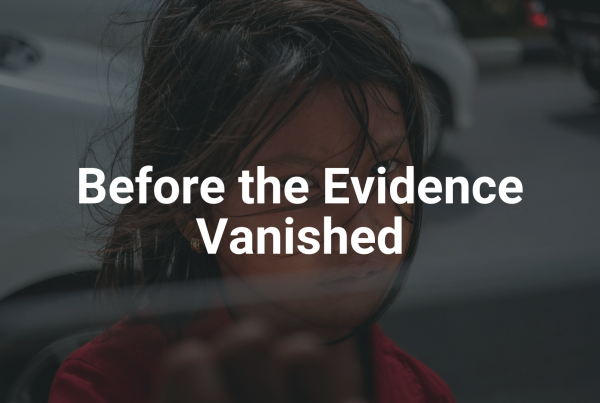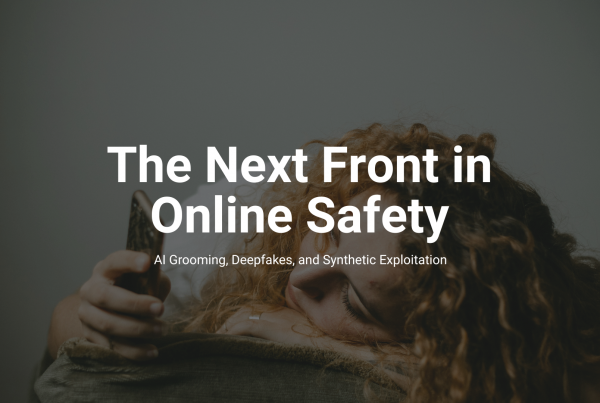For a video presentation on this same topic, see the video below. Shane McCombs, our COO, discusses vigilantism during DefCon 27
“If you want something done right, you have to do it yourself,” comes to mind when thinking about vigilantism. When child sex abuse is so prevalent, it can be infuriating that more is not being done to stop child predators.
As people, we have a hunger for justice, and it can be frustrating when justice does not play out as we thought it should. We must fight for what is right, but what if your action hurts the cause more than it helps?
This is a question we must consider when examining vigilante pedophile hunting.
What is Vigilantism?
The legal dictionary defines vigilantism as “taking the law into one’s own hands and attempting to effect justice according to one’s understanding of right and wrong; private enforcement of legal norms in the absence of an established, reliable, and effective law enforcement body.”
To rephrase, vigilantism is when an individual uses his or her perception of right and wrong to enact their own justice, outside of the established judicial system.
Particularly with child sex abuse, it is understandable to want to take action. Especially when it seems like the system meant to protect children is understaffed, underfunded, overworked, and on the hamster wheel of technology and social media.
In theory, vigilantism sounds like a solution to the overburdened system, but there is more to consider when contemplating taking up vigilante justice.
More to Vigilantism than Meets the Eye
Without law enforcement’s support, resources, and clear procedural guidelines, vigilante efforts are often dangerous and ineffective. We understand this is a bold statement, and we do not want to put forth such a claim without offering reasons to back our logic. To explain this further, we will go over:
- The typical vigilante pedophile hunter operation
- Uncertainties of vigilante confrontations
- The impact of vigilante efforts on child safety
- Physical and legal dangers of participating in vigilantism
- Other ways of achieving the same end goal
What is the Typical Operation of Vigilante Pedophile Hunters?
The most common operation for vigilante pedophile hunters involves them creating fake online profiles. The fake online profiles allow them to disguise their true identity and pretend to be children. The fake child profiles are used to find, identify, and engage predators in conversation with someone they think is a child.
Sometimes the fake profile has a legal adult age listed only to reveal the “true,” much younger, age through messaging. If the person chatting with the fake profile continues engaging in sexually-based conversation after finding out the “real” age of the “child,” the vigilante pedophile hunters work to set up a time to meet with and confront the predator.
Confronting Child Predators
Once the vigilante pedophile hunter and child predator establish a time to meet, the pedophile hunters get ready for a confrontation. The confrontations often happen at night and in public places (e.g., gas stations, parking lots, etc.), but encounters are not limited to those places.
Confrontations are often unpredictable, and the course of events can vary tremendously. The vigilante pedophile hunter will use a device, usually their smartphone, to record the encounter and post the video online.
The confrontation begins when the vigilante pedophile hunter approaches the child predator. The hunter will confront the predator about going to meet a child, and this typically leads to a hostile exchange of words and/or threats. At some point the hunter will share that he has the conversation recorded, and that he plans to post the video on social media. Occasionally a confrontation may result in an arrest, but a successful prosecution is unlikely.
Vigilantism’s Effect on Child Safety
We are all on the same team: we want to protect children from predators. But what if your efforts to protect children actually have the opposite effect? Vigilante pedophile hunting has the potential to minimize legal action against pedophiles while creating severe consequences for the children you want to protect.
As private citizens, vigilante pedophile hunters do not operate under rules or regulations that outline how they may obtain evidence or how much evidence is enough to prove guilt. Often, the quality evidence from vigilante groups does not come close to meeting standards of law enforcement.
A highly-prevalent topic in law enforcement is entrapment. A significant issue with vigilantism and pedophile hunting is entrapment. According to the Merriam-Webster Dictionary, entrapment is defined as, “The action of luring an individual into committing a crime to prosecute the person for it.” So if it is an issue for law enforcement, it is that much more prevalent with vigilante pedophile hunting. When evidence is collected through entrapment, it does not stand in court.
Law enforcement follows strict rules and regulations to develop cases and prosecute criminals. If evidence collection does not adhere to the firm guidelines that law enforcement must follow, the evidence cannot be used in court. The evidence would violate the defendant’s right to due process. Due process is a clause within the Fifth Amendment, later expanded in the 14th Amendment, that requires the federal and state government respect all legal rights of citizens. Any evidence that violates due process is not liable to be used in prosecution.
Going beyond the scope of evidence collection and usefulness, defense attorneys can argue different factors that would help child predators receive lesser charges. Anders Walker, a professor at St. Louis University School of Law, emphasized this point. Walker explained that a good defense attorney could easily make a pedophile hunter look like they have a motive to set someone up. Walker also noted the issues with amateur evidence collection and entrapment.
Legality aside, what about the children? Since methods vigilante pedophile hunters use to catch predators are public and well-documented, child predators can learn to avoid getting caught. With this information available, pedophiles have a better chance of not getting caught, or not getting caught for all of their crimes against children.
Vigilante pedophile hunters might catch child predators for one crime, but they often do not know about the child predator’s other crimes. Since confrontations typically do not end with an arrest on the spot, child predators can go home to conceal or destroy evidence of more crimes.
Without help from law enforcement, there is no way to ensure legal action or definitively protect child victims.
Consequences for Vigilantes
Vigilante pedophile hunters are not devoid of risk. People can do crazy things when backed into a corner—child predators included. One never knows how a confrontation will unfold, if peodophiles will retaliate, or if there will be other ramifications for pursuing vigilante justice. As a private citizen, you are not protected by the same legal safeguards as law enforcement.
An incident where the confrontation did not go as planned was when a vigilante pedophile hunter got attacked by the predator he hoped to catch. In August 2017, Shane Erdmann, the vigilante pedophile hunter who founded POPSquad, arranged a time to confront Jordan Malmstrom, a 33-year-old man, who was allegedly going to meet a 14-year-old girl. Neither Erdmann nor Malmstrom thought the meeting would unfold as it did. When Malmstrom realized he was caught trying to meet a minor and saw that he was being filmed, he fought back. Malmstrom repeatedly punched Erdmann before stealing Erdmann’s camera and driving away—hitting Erdmann’s leg as he fled.
Malmstrom was charged with assault, larceny and enticing a minor (all to which he pled not guilty), but the charges got dropped. Perhaps the failed confrontation would have been worth it if Malmstrom went to prison, but after all this, the bad guy got away.
Potential for Prison Time
Pursuing justice on your own does not exempt you from the United States Justice System. Jason Vukovich, a 42-year-old Alaskan man, identified himself as an “avenging angel” who pursued vigilante justice. As a child, Vukovich suffered physical and sexual abuse, and a way for him to take action was to become a vigilante as an adult.
After using the sex offender registry to locate and attack three pedophiles, Vukovich was sentenced to 23 years in prison for assault and robbery. He used the sex offender registry to gather his targets’ personal information. This allowed him to find and enter each person’s home, severely beat them, and steal from them before leaving.
While waiting to receive his sentence, Vukovich reflected and warned against taking the law into your own hands, “There is no place for vigilante justice in an ordered society.” Vukovich continues, “If you have already lost your youth, like me, due to a child abuser, please do not throw away your present and your future by committing acts of violence.”
Hunter Becomes Prey
As a pedophile hunter, you are not exempt from physical injury or legal repercussions. Moreover, you can fall victim to the pedophiles whom you want to expose. By participating in vigilantism, you are opening yourself to being a target of pedophiles.
As a vigilante pedophile hunter, you open yourself to substantial threats including, but not limited to, physical danger, legal consequences, and retaliation. As a vigilante pedophile hunter, you do not get the same physical and legal protections as law enforcement. When contemplating getting involved with vigilante pedophile hunting, we implore you to be wary of the potential consequences.
A Different Way to Protect Children
The Innocent Lives Foundation is an non-vigilante organization devoted to identifying and reporting those who prey on our children.
By remaining as anonymous as possible and avoiding confrontation—the exact opposite of the vigilante method—we reduce the threats to safety, increase the chances of prosecution and stay focused on our mission. Our mission is to unmask anonymous child predators and help bring them to justice.
We all want the same thing: to end child sex abuse. You can make a difference, but it is important to go about making a difference in a safe way.
Protect yourself. Protect your loved ones. Help us unmask the bad guys.





